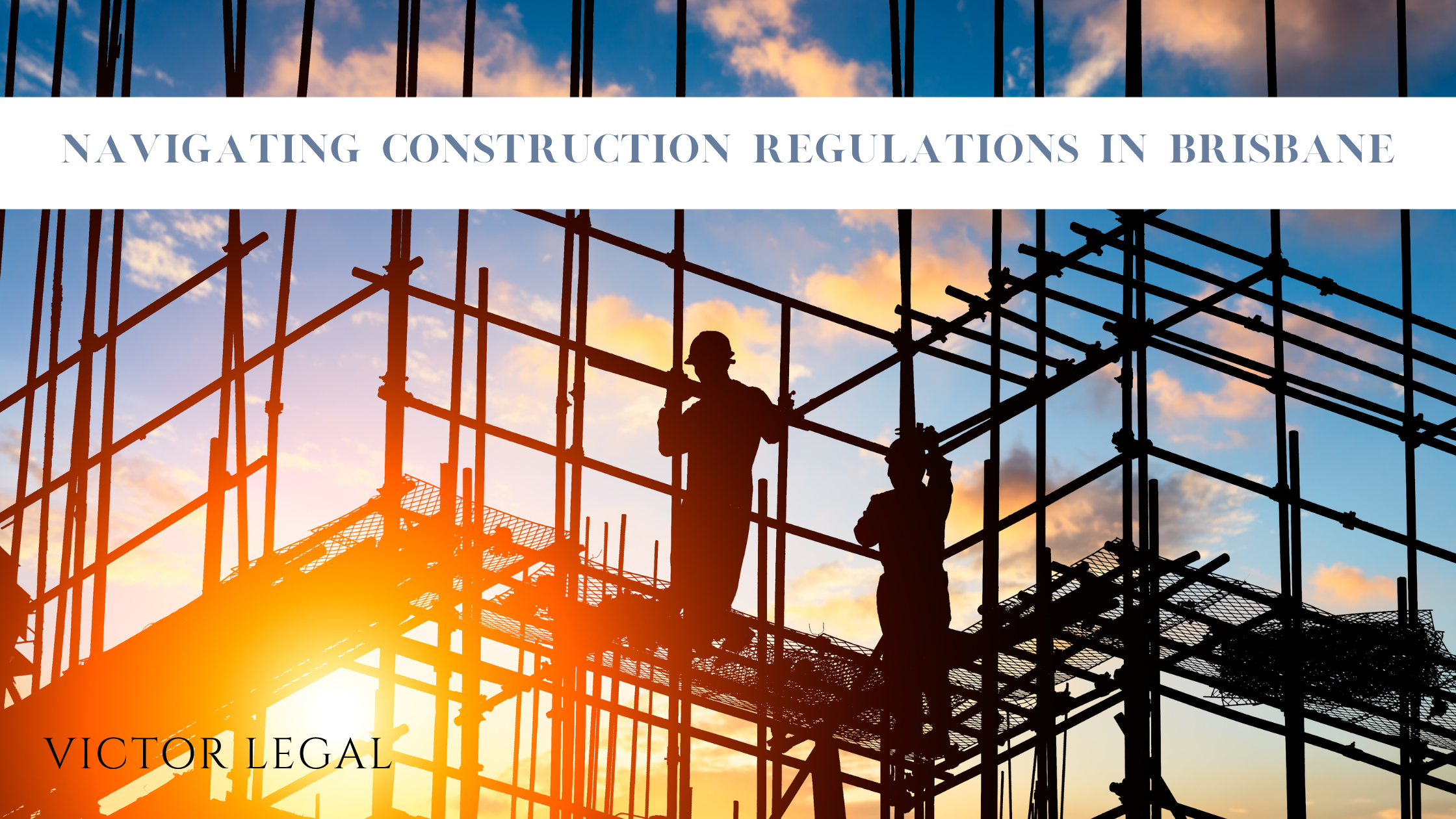Construction standards and regulations play a huge role in the construction industry. They serve as guidelines for ensuring that your project is safe, durable, functional and, most importantly, legal. And the consequences for non-compliance can be pretty serious, including even the loss of your license in some circumstances.
So as a builder, it’s essential that you have a comprehensive knowledge of all the applicable construction laws in Brisbane and across Australia. As experienced construction lawyers, we’re across all the legal requirements in the construction industry. And we’re here to help you navigate them with ease.
In this article – A Legal Guide to Construction Laws
- The National Construction Code
a. Building Code Australia
b. Plumbing Code of Australia
c. Housing Provisions
d. Livable Housing and Design Standard - Queensland Development Code
- Other applicable regulations
- Consequences of Non-Compliance
- Getting Expert Support
a. Benefits of working with a construction lawyer
What are the Construction Laws in Brisbane?
When it comes to construction laws, there are some that are nationwide and some that are state based. These laws and regulations are designed to ensure that buildings are safe, high quality and meet environmental concerns.
In general, the building codes that apply in the Brisbane are:
- The National Construction Code (NCC), which includes:
- The Building Code of Australia
- The Plumbing Code of Australia
- The Housing Provisions
- The Livable Housing and Design Standard
- The Queensland Development Code
The National Construction Code
The National Construction Code (NCC) came into effect in May 2023, marking one of the biggest changes to construction law in two decades. It consolidates the requirements for construction in Australia, including design, plumbing and even drainage. It’s main focus is on setting out the minimum requirements for safety, health, amenities, sustainability and accessibility.
In Queensland the NCC is given legal effect through Queensland’s Building Act 1975. It’s then varied by amendments in the Queensland Development Code.
Within the NCC there are four main areas covered. These are the BCA, the PCA, the Housing Provisions and the LHDS.
- Building Code Australia
The Building Code Australia (BCA) is contained in volumes 1 and 2 of the NCC. These cover all the technical provisions and requirements for the design and construction of buildings and structures generally. (Volumes 1 and 2 differ in the types of buildings they cover. - Plumbing Code of Australia
The Plumbing Code of Australia (PCA) is set out in volume 3 of the NCC. This is the part of the code that provides the technical provisions for the construction of water services, drainage systems, plumbing, HVAC systems and waste management. - Housing provisions
The Housing Provisions are a separate part of the NCC that sets out all the acceptable construction manuals and practices. These are not prescriptive but instead give provisions that would be ‘deemed to satisfy’ the requirements of the NCC. - Livable Housing and Design Standard

As of 1 October 2023, the provisions of the Livable Housing and Design Standards (LHDS) came into effect (except in Tasmania). These provisions are designed to ensure that homes are built in a way that will better meet the needs of community, are more accessible and energy efficient.
For example, under the LHDS doorways are required to be wider and at least one shower to be entered without a step to allow for older people or those with a disability continued access.
Queensland Development Code
If you’re building in Queensland, you’ll need to comply with the Queensland Development Code (QDC). The QDC consolidates Queensland specific building standards into a single place.
The QDS works in conjunction with the NCC, dealing with all Queensland construction matters which are outside the scope of, or in addition to, the NCC. However, if there’s a discrepancy between the QDC and the NCC here in Queensland, the QDC will give you your final answer.
Some things that are covered by the QDC are fire safety, sustainability and building maintenance.
Other applicable regulations
There may be other requirements imposed by local council planning schemes and local laws. For example, some residential areas in Queensland may be covered by heritage or building character overlays which can impact the type of construction you can do on the home.
Getting expert advice can help you determine any challenges you might have to your building project.
Consequences of Non-Compliance
Meeting all construction law obligations is essential, and the results from a failure to do so can be severe. The Queensland Building and Construction Commission (the statutory body that regulates the building industry) gives a range of consequences from education, advice and warnings to fines, injunctions and license cancellation. So it’s important to comply with all the applicable building standards and codes.
Getting Expert Support
Getting expert support navigating construction laws might mean the difference between a stress-free and frictionless build, and one peppered with inconveniences and uncertainties. In fact, construction attorneys play an integral role within the construction industry by offering vital legal counsel and guidance to anyone looking to build in Brisbane.
Benefits of working with a construction lawyer
- Expert legal counsel guidance and advice
- Better collaboration between stakeholders (such as property developers, builders and subbies)
- Drafting and reviewing contracts
- Facilitating negotiations for construction contracts
- Helping to resolve disputes that might arise during project execution
- Ensuring all parties understand their legal obligations and duties, as well as their rights and entitlements
- Representing clients in legal proceedings and safeguarding their interests
Get Expert Legal Advice Today
At Victor Legal, we’re experienced construction lawyers. We’re trusted by building and construction experts across Brisbane. We can help you ensure that the legal and contractual aspects of your construction project align with all applicable legal standards and regulations. Contact us today!

